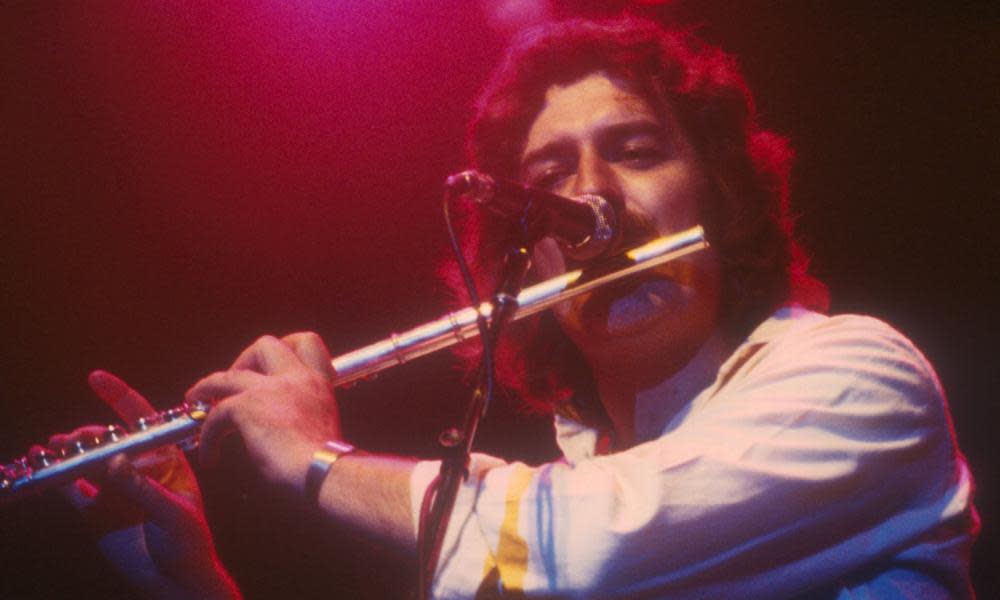Ray Thomas obituary

Ray Thomas, a founding member of the Moody Blues, who has died aged 76, played various instruments, including the French horn, oboe, piccolo, harmonica and saxophone, but was best known as the group’s flautist. Jethro Tull’s Ian Anderson would become rock’s most flamboyant flute-brandisher. However, Thomas’s solo in the band’s biggest hit Nights in White Satin, which went to No 2 in the US and reached No 9 in the UK at the end of 1967 (one of its three appearances in the UK Top 20), perfectly encapsulated the song’s mood of mystical melancholy.
Though they started out as an R&B band in Birmingham, the Moody Blues became early pioneers of symphonic rock, and precursors of the 1970s progressive movement. Their debut album, The Magnificent Moodies (1965), went to No 5 in Britain, but it was not until the band regrouped in 1966 that they found their true musical direction.
Days of Future Passed (1967), which contained Nights in White Satin, was released six months after the Beatles’ Sgt Pepper’s Lonely Hearts Club Band but could claim to be a more fully realised concept album, with its quasi-classical, multipart songs that frequently elided seamlessly together. It reached 27 in the UK, and, boosted by a reissue of Nights in White Satin, reached its US peak of No 3 in 1972. It contained two of Thomas’s compositions, Another Morning and Twilight Time.

The group were often ridiculed for their cosmically portentous lyrics, but they enjoyed an awesome streak of success that would stretch into the 80s, bringing them 14 consecutive Top 30 albums in Britain, including three No 1s – On the Threshold of a Dream (1969), A Question of Balance (1970) and Every Good Boy Deserves Favour (1971). Over the same period, they scored 13 entries in the US Top 30, with Seventh Sojourn (1972) and Long Distance Voyager (1981) topping the US albums chart. The single Question (1970) reached No 2 in Britain and 21 in the US.
Thomas was born in Stourport-on-Severn, Worcestershire, in Lickhill Manor, a building commandeered during the second world war to shelter expectant mothers from German air-raids on Birmingham. His family later moved to a council estate in the suburb of Erdington, where the Moody Blues bassist John Lodge also grew up. When Ray was nine his Welsh father began teaching him to play the harmonica, and he joined his school choir when he was 10. He left school at 14 and trained as a tool-maker, but wanted to pursue music. In 1958 he joined the skiffle group the Saints and Sinners (playing tea-chest bass), and in 1959 graduated to El Riot and the Rebels, as vocalist and harmonica player. Also in the band were Lodge and the keyboards player Mike Pinder.
The Moody Blues story began in 1964 when Denny Laine, formerly of Denny Laine and the Diplomats, banded together with Thomas and Pinder, who by then had been performing together in the Krew Kats at the Top Ten club in Hamburg. When their engagement fell through, the penniless pair had walked to Ostend, where the British consulate gave them enough money to get home.
The first Moody Blues lineup was completed by the drummer Graeme Edge and the bass player Clint Warwick, and was initially known as the M&B Five, with the aim of attracting sponsorship from Birmingham’s Mitchells & Butlers brewery. When no funding materialised, they adapted the name to the Moody Blues Five. They soon dropped the “Five”, and scored an immediate No 1 hit with Go Now (a version of a song first recorded by Bessie Banks in the US). However, despite TV appearances and a UK tour supporting the Beatles – they were managed for a time by Brian Epstein – the band found themselves trapped on the cabaret circuit wearing blue suits and cravats. By October 1966 Warwick and Laine had left. Thomas, Pinder and Edge recruited Lodge and a guitarist, Justin Hayward, and the hits soon resumed.
Having become friendly with the Beatles, in 1967 Thomas recorded backing vocals on I Am the Walrus and played harmonica on Fool on the Hill. During a temporary mid-70s Moody Blues break-up, he released the solo albums From Mighty Oaks (1975) and Hopes Wishes and Dreams (1976). He was back with them for Octave (1978), Long Distance Voyager and The Present (1983), and wrote songs for all three. His contributions were negligible for the rest of the 80s, but he returned as writer and musician for Keys of the Kingdom (1991). He made his last appearance on Strange Times (1999), before retiring in 2002. In 2010 he released a remastered box set edition of his solo albums.
He had been suffering from cerebellar ataxia, which affected his balance and made performing impossible, and in 2013 he was diagnosed with prostate cancer.
He is survived by his second wife, Lee Lightle, whom he married in 2009; and by three children, Nancy, Adam and Zoe, from his first marriage, to Gill, which ended in divorce.
• Raymond Thomas, musician, singer and songwriter, born 29 December 1941; died 4 January 2018

 Yahoo News
Yahoo News 
